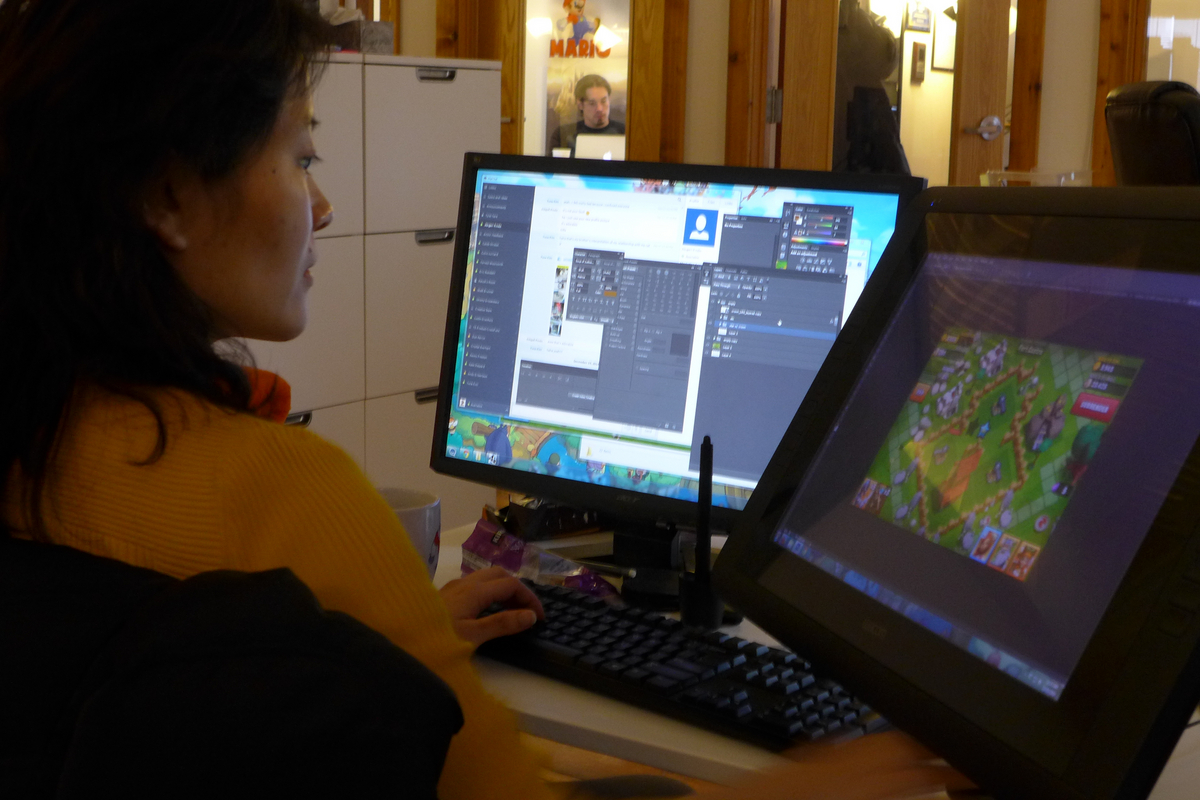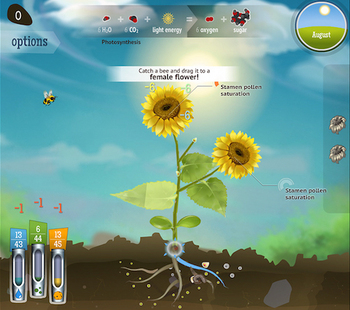Games a winning industry for firms with UW ties

Designer Yuna Kim develops a video game at PerBlue, a startup founded by former computer sciences and engineering students at UW–Madison. Another local gaming company, Filament Games, also has roots at the university.
Photo: David Tenenbaum
Forrest Woolworth is used to seeing employees play video games at work. Woolworth, the chief operating officer of a Madison startup called PerBlue that creates games for smartphones, calls this “serious play.”
“People don’t play here to waste time,” he says. “You play a lot differently; you learn from the competition.”
PerBlue has clearly learned plenty since it started in 2008: Its new release, “Titan Empires,” reached 1 million users in just three weeks after its October launch. The company, the brainchild of a small group of computer sciences and engineering students at the University of Wisconsin–Madison, has 22 employees, is hiring more and has just received a $3 million investment.

Users start with a seed and help it flower in “Reach for the Sun,” an educational tool developed by Madison-based Filament Games.
Photo: Filament Games
PerBlue isn’t the only Madison gaming company with UW–Madison roots. Filament Games, which makes educational video games, spawned when three founders — who were all at the university — wrote a grant and quickly noticed that they had a company on their hands, says CEO Lee Wilson. The company builds games for formal learning environments where a teacher, trainer or professor is present. Filament is also hiring. Its 47 current employees include storytellers, programmers, designers and a composer.
Both Wilson and Woolworth spoke at a November program on the growing video game industry in Wisconsin, sponsored by the Wisconsin Technology Council.
PerBlue’s niche is role-playing games for smartphones running the iOS and Android operating systems. In these games, users create an identity and populate a virtual world. PerBlue aims to make games that can be played at different levels of engagement, depending on the player’s mood and availability.
Games for smartphones — like smartphones themselves — barely existed in 2008, when PerBlue’s founders were undergraduates at UW–Madison, Woolworth says. “We were working on homework together at night and decided to work on a cool game project instead. We wanted to make a role-playing game that was fun to play and utilized all of this cool technology in the iPhone.”
Users build a city and turn it into an empire in PerBlue’s newest creation, “Titan Empires.”
Photo: PerBlue
In the summer before their senior year, most of the core group — including Woolworth, CEO Justin Beck, and Andrew Hanson, chief technology officer — were working at big tech firms on the West Coast.
“When we came back to Madison,” Woolworth says, “we decided to give this a shot. Entering the smartphone market in 2009 was like getting into the Internet space in 1995, as far as potential for changing the world.We had assembled a team of five awesome people who liked to work together.”
Although the technology and team were both primed, the company’s first game, “Parallel Kingdom,” needed three years to reach 1 million users.
A good game is only a starting point, Woolworth says. “There are more than 1 million apps on the Google Play Store. If users have to sort through 20,000 apps to reach you, it’s not going to happen, so we have to focus on marketing strategy to drive players to us.”
Five years ago, it was not obvious that games would be a hit on mobile devices: Not one game won the first developer competition for Android. Yet games accounted for 72 percent of mobile app revenue in 2013, and mobile and online games are expected to reach $60 billion as an industry by 2017.
Mobile games have grown more complex, Woolworth says. “The technology has gotten a lot better, the games look better, and that makes producing them much more involved and expensive.”
“When you look at the startup landscape, there are a lot of places with ties that circle back to UW.”
Forrest Woolworth
Because the app itself is free, PerBlue must keep users engaged so they continue to play and purchase “virtual currency” that they can spend on assets like players or weapons in the game. To get the necessary look, sound, story and interactivity, PerBlue hires coders, developers, directors, artists and composers.
Neither PerBlue nor Filament Games meets the strict definition of a UW–Madison spinoff, a company that licenses an invention from a university lab. But as Woolworth notes, neither one would be in Madison without the university.
“In all the work I do related to startups, there are all these companies that would not be counted in the spinoff statistics, but by far the majority have some direct ties to UW–Madison: the founders went there, they participated in the Burrill Business Plan Competition, a lot of the employees went there. When you look at the startup landscape,” he says, “there are a lot of places with ties that circle back to UW.”


